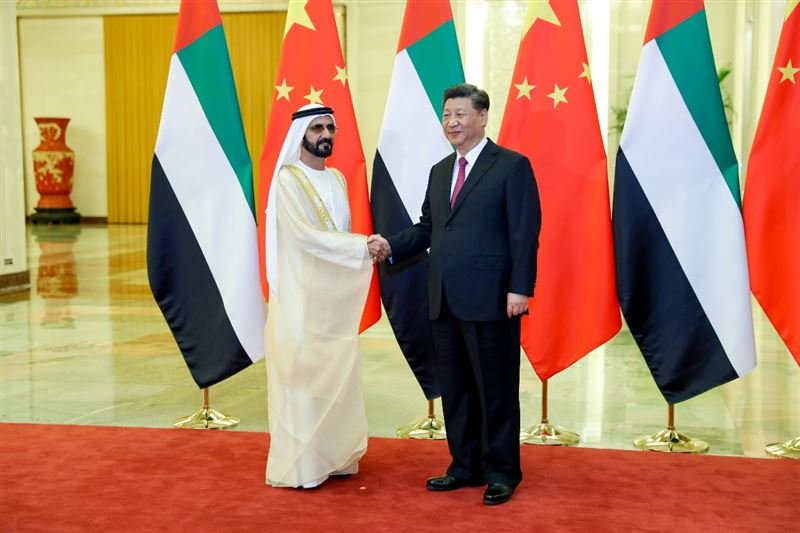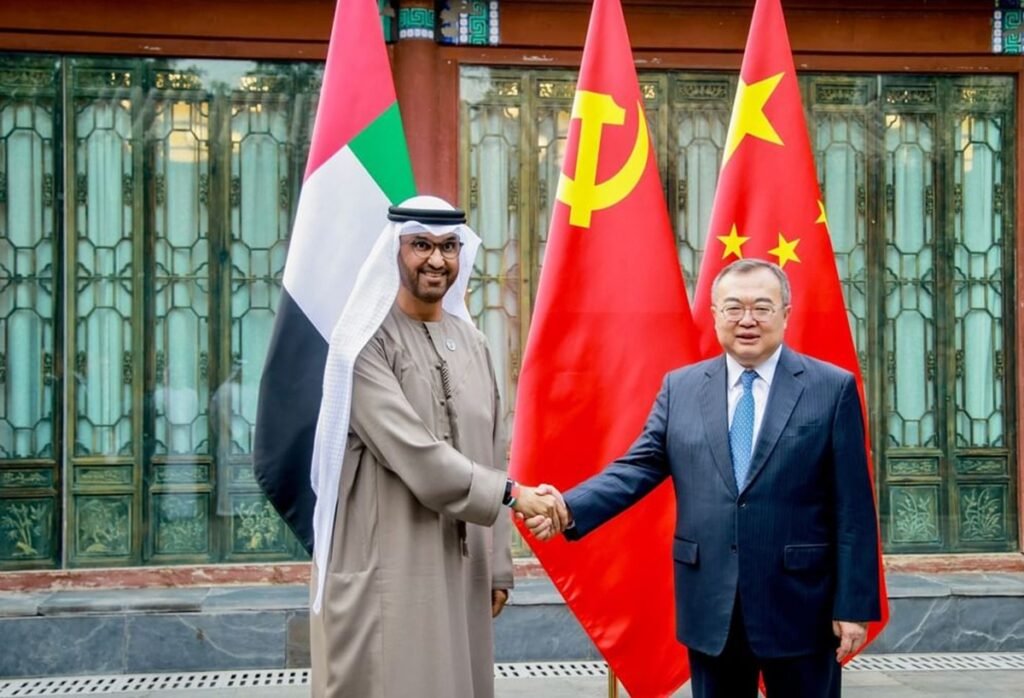Under the expert leadership of Dr. Sultan Al Jaber, the UAE has launched a groundbreaking delegation to China, marking a milestone in bilateral relations. With trade surpassing the $100 billion threshold, both nations are aggressively pursuing deeper collaboration across trade, technology, green energy, finance, and culture.
Rapid Trade Expansion
Bilateral trade in 2024 surged past $102 billion, marking a record-breaking increase from the previous year. In 2023, trade had already approached the $100 billion mark, and by the third quarter of 2024, figures were already at $74.5 billion—setting the pace for another landmark year.
These numbers confirm China’s position as the UAE’s top trading partner and reinforce the UAE’s growing significance as a non-oil economic hub in the Middle East. As trade volumes climb, so too does the appetite for long-term partnership, innovation, and sustainable development.

Tech & Energy: Cutting‑Edge Synergy
The UAE and China are not just exchanging goods—they’re shaping the industries of tomorrow. Their cooperation extends deeply into advanced sectors like artificial intelligence, smart infrastructure, and 5G connectivity.
Chinese tech giants such as Huawei and Alibaba are playing active roles in the UAE’s digital transformation, while Emirati-backed ventures in AI and big data are gaining momentum with Chinese support and expertise. Innovation parks across Abu Dhabi and Dubai are now hosting joint research teams, collaborative projects, and AI labs staffed by both Emirati and Chinese experts.

This partnership isn’t theoretical—it’s powering real-world impact. From smart city architecture to high-speed data connectivity, UAE-China tech cooperation is reshaping how businesses and citizens experience the digital age.
Clean Energy Revolution
A key pillar of the UAE-China partnership lies in their shared vision for a sustainable future. The two countries have already launched several clean energy megaprojects that are making headlines around the world.
Massive solar installations in the UAE, built with the help of Chinese engineering expertise, now supply clean energy to hundreds of thousands of homes. Wind power demonstration projects are not only generating electricity but also creating local jobs and reducing annual emissions significantly.
More importantly, these are just the beginning. Joint projects in hydrogen fuel, carbon capture, and energy storage are in the pipeline, promising to accelerate the transition to a greener, more sustainable energy ecosystem across both nations.
Infrastructure & Logistics: A New Silk Road
Infrastructure development has been another cornerstone of UAE-China economic relations. The partnership is creating new logistics corridors that enhance trade flows not just between these two countries, but across Asia, Africa, and Europe.

Chinese shipping giants are investing in UAE ports, helping transform them into some of the most advanced logistics hubs in the world. At the same time, industrial free zones across the Emirates are welcoming a new wave of Chinese investment, fostering manufacturing, innovation, and employment opportunities.
New infrastructure is also being developed with a long-term vision. High-speed rail networks, smart warehousing, and integrated customs systems are being planned and executed in alignment with global best practices—setting a new benchmark for trade and logistics efficiency in the region.
Finance & Currency Innovations
Financial integration is advancing rapidly, especially as both nations explore alternatives to traditional global payment systems. A significant development in this arena is the adoption of local currency settlements. The first cross-border payments using digital dirham and renminbi have already taken place, and volume continues to rise.
Additionally, both governments have renewed their currency swap agreements and launched a $10 billion joint investment fund focused on energy, infrastructure, AI, and advanced industries. The goal is not just to facilitate trade, but to build a more resilient and multipolar financial ecosystem.
This step marks a bold move towards reducing reliance on the dollar and creating faster, more cost-effective payment solutions for businesses on both sides.
Cultural & Educational Bridges
Beyond economics, UAE-China ties are also being strengthened through people-to-people engagement. Over 900 Chinese companies now operate in the UAE, especially within dynamic free zones in Dubai and Abu Dhabi. Meanwhile, Chinese tourism is rebounding, and flights between major cities have become more frequent.
Education has become a cornerstone of bilateral trust. More than 170 schools across the UAE offer Mandarin courses, and educational exchange programs have been expanded to include language, culture, and science partnerships. This cultural exchange is further supported by joint research, sister-city programs, and new university alliances.
These soft-power ties deepen the human aspect of this partnership, ensuring that cooperation goes far beyond trade deals and into the hearts and minds of future generations.
Why It Matters: Strategic & Global Impact
Economic Diversification
The UAE is committed to diversifying its economy beyond oil, and its partnership with China accelerates this ambition. By investing heavily in technology, renewables, and advanced manufacturing, the Emirates are laying the foundation for long-term prosperity that isn’t tied to traditional energy markets.
China, with its massive industrial capabilities and technological expertise, plays a key role in that vision. This collaboration allows the UAE to leapfrog into emerging sectors while also positioning itself as a gateway between East and West.
Geopolitical Balance
In a world increasingly defined by shifting alliances and multi-polarity, the UAE is crafting a balanced and pragmatic foreign policy. It maintains strong partnerships with the West, particularly the United States, while also expanding its cooperation with China.
This diplomatic flexibility allows the UAE to harness the best of all worlds, attracting investment, enhancing security, and fostering innovation from multiple sources. It is a model of how smaller nations can thrive in a complex geopolitical landscape.
Green Innovation
Climate change is a shared concern—and an area where UAE and China are already proving what’s possible. With both countries pledging net-zero targets (UAE by 2050 and China by 2060), their joint projects in solar, hydrogen, and carbon capture are not just good policy—they’re essential.
Their clean energy collaboration is also creating jobs, building capacity, and providing a blueprint for other nations seeking to balance economic growth with environmental responsibility.
Global Financial Shift
As global trade begins to adopt a more diversified financial system, the growing use of local currencies and digital payment frameworks is significant. The UAE and China are early adopters in this movement, piloting projects that may influence how international trade is conducted in the future.
With more companies and governments embracing these tools, we may see a shift away from centralized financial systems toward a more distributed and resilient model of global commerce.
Delegation Led by Dr. Sultan Al Jaber
The UAE’s mission to China was spearheaded by Dr. Sultan Al Jaber, a visionary leader known for his strategic insight and commitment to sustainable development.
As the Minister of Industry and Advanced Technology, and the President of COP28, Dr. Al Jaber brings both political clout and technical expertise to the table. His leadership reflects the UAE’s broader goal of aligning economic growth with climate action, innovation, and diplomacy.
During his visit, key discussions focused on expanding green energy cooperation, launching next-gen digital infrastructure, and formalising RMB-denominated trade settlements. Dr. Al Jaber’s presence underscored the importance of trust, consistency, and long-term thinking in international partnerships.
Looking Ahead: What Comes Next
Doubling Trade by 2030
Both governments have set an ambitious goal: expanding bilateral trade to $200 billion by the end of the decade. Given current momentum, this is not only possible but likely—especially with the planned expansion in finance, logistics, tech, and renewables.
RMB Integration
As local currency trade becomes more widespread, expect greater financial innovation. More cross-border RMB transactions and digital currency pilots are in the works, streamlining transactions and boosting efficiency.
New Mega Projects
Next-gen projects in solar, hydrogen, carbon capture, smart transportation, and electric mobility are being scoped out. These will help both nations meet their climate goals while fostering innovation and economic growth.
Cultural Exchange

The next chapter in UAE-China relations will be human-centric. More student exchanges, deeper academic collaboration, and the promotion of mutual language learning will solidify the friendship at a grassroots level.
Humanising the Vision
Behind every number is a person. A student learning Mandarin in Sharjah. A Chinese engineer working on a solar farm in Abu Dhabi. A young Emirati entrepreneur launching a fintech app with a Chinese partner. These stories matter.
As this partnership matures, its human impact becomes even clearer. It’s not just about billions traded or megawatts generated—it’s about ideas shared, challenges solved, and futures created together.
Conclusion
What began as a pragmatic trade relationship has evolved into a dynamic, forward-looking alliance. The UAE and China are crafting a partnership that is resilient, diversified, and deeply human.
From clean energy to artificial intelligence, from logistics to education, this $100 billion bond is more than a figure—it’s a shared journey toward prosperity, sustainability, and global influence. With leaders like Dr. Sultan Al Jaber at the helm, the future of UAE-China cooperation looks not only bright—but transformational.
Do follow UAE Stories on Instagram
Read More: European Film Festival 2025 Kicks Off at the Cultural Foundation Abu Dhabi












